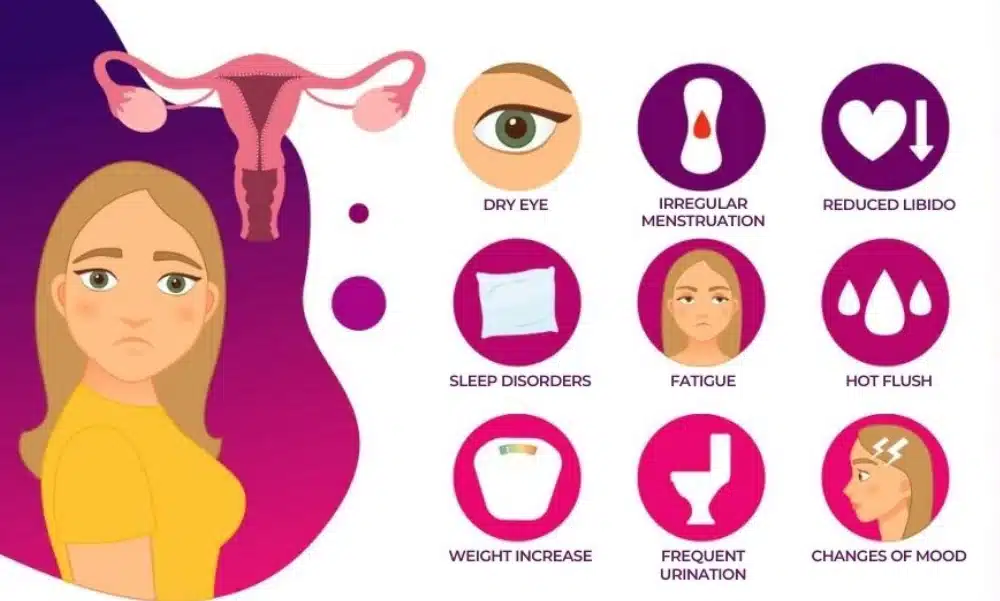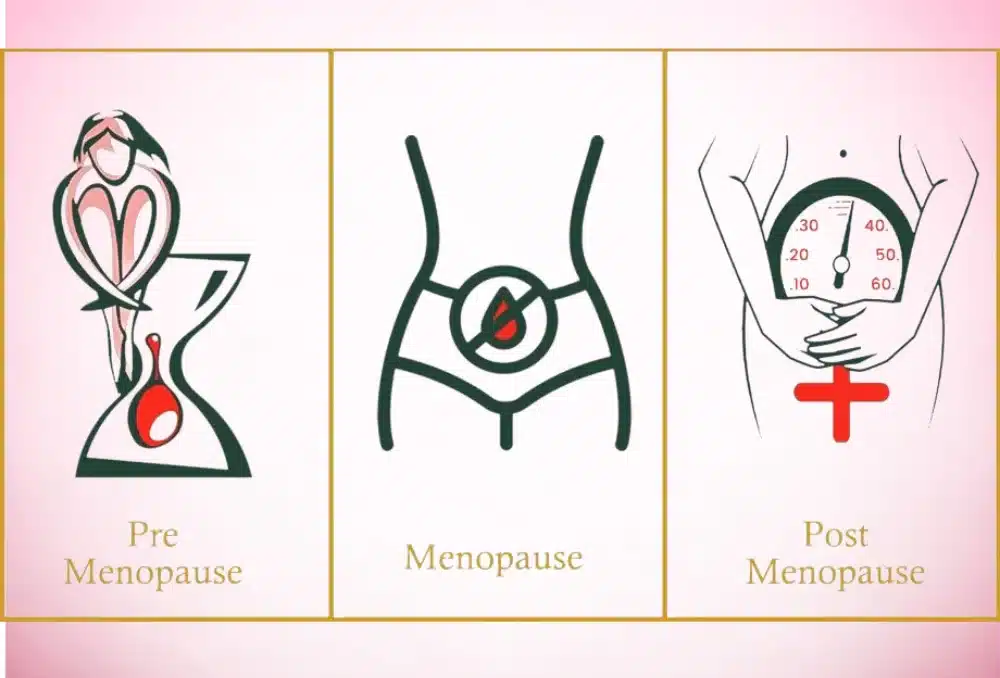Menopause is a natural phase in life that marks the end of a woman’s reproductive years, typically occurring between ages 45 and 55. While the menopause transition is unique to each individual, the duration and severity of its symptoms vary widely. Some women experience minimal disruption, while others endure prolonged and intense symptoms. Understanding how long menopause symptoms last, the factors influencing their duration, and available treatment options can help women navigate this transition with confidence.
Stages of Menopause and Duration of Symptoms

Menopause occurs in three distinct stages:
1. Perimenopause
- Onset: Typically begins in the 40s but can start in the 30s.
- Duration: Can last 4–10 years.
- Symptoms: Irregular periods, hot flashes, night sweats, mood swings, and vaginal dryness.
2. Menopause
- Definition: The point when a woman has gone 12 consecutive months without a period.
- Average Age: Around 51 years old.
- Symptoms: Hot flashes, sleep disturbances, and changes in libido.
3. Postmenopause
- Onset: Begins one year after the final menstrual period.
- Duration: Lasts for the rest of a woman’s life.
- Symptoms: Hot flashes may persist for a few years but typically decrease in intensity. Vaginal dryness and increased risk of osteoporosis or cardiovascular disease can occur.
Common Menopause Symptoms and How Long They Last
The symptoms of menopause vary in duration and intensity.
| Symptom | Typical Duration | Notes |
|---|---|---|
| Hot Flashes | 4–7 years on average; up to 10+ years in some cases | Can occur day or night, often triggered by stress, diet, or environment. |
| Night Sweats | Same as hot flashes | Often disrupts sleep, contributing to fatigue. |
| Vaginal Dryness | Persistent postmenopause | Can worsen without treatment. |
| Sleep Disturbances | Throughout perimenopause and early postmenopause | Often linked to night sweats and hormonal changes. |
| Mood Swings | During perimenopause, typically improves postmenopause | May be influenced by stress, lifestyle, and hormone fluctuations. |
| Cognitive Issues | During perimenopause, resolves in postmenopause | Includes memory lapses and difficulty concentrating. |
Factors Influencing the Duration of Menopause Symptoms
Several factors can affect the duration and intensity of menopause symptoms:
- Genetics
- Family history plays a significant role in determining when menopause begins and how long symptoms last.
- Ethnicity
- Studies show that Black women tend to experience longer-lasting and more severe hot flashes, while Asian women may have shorter durations of symptoms.
- Lifestyle Choices
- Smoking, alcohol consumption, and sedentary habits can prolong symptoms.
- Overall Health
- Chronic conditions like diabetes or thyroid disorders can exacerbate menopause symptoms.
- Psychological Factors
- Stress and mental health issues like anxiety or depression can heighten symptom severity.
Treatment Options for Menopause Symptoms

1. Hormone Replacement Therapy (HRT)
- Effectiveness: Highly effective for hot flashes, night sweats, and vaginal dryness.
- Types:
- Estrogen-only HRT: For women without a uterus.
- Combined HRT: Estrogen and progesterone for women with a uterus.
- Risks: May increase the risk of blood clots, breast cancer, and stroke in some women.
2. Non-Hormonal Medications
- Selective Serotonin Reuptake Inhibitors (SSRIs): Helps with hot flashes and mood swings.
- Gabapentin: Reduces night sweats.
- Clonidine: Manages hot flashes and blood pressure.
3. Lifestyle Modifications
- Dietary Changes: Avoid triggers like caffeine, alcohol, and spicy foods. Incorporate calcium-rich foods for bone health.
- Exercise: Regular physical activity can improve mood, sleep, and bone strength.
- Stress Management: Practices like yoga, meditation, and deep breathing can alleviate symptoms.
4. Natural Remedies
- Black Cohosh: May reduce hot flashes, though evidence is mixed.
- Soy Isoflavones: Mimic estrogen and may help balance hormones.
- Vaginal Moisturizers: Over-the-counter products for dryness and irritation.
5. Complementary Therapies
- Acupuncture: Some women report relief from hot flashes and anxiety.
- Cognitive Behavioral Therapy (CBT): Effective for managing mood swings and sleep issues.
When to Seek Medical Attention
While menopause is a natural process, certain symptoms warrant medical evaluation:
- Persistent Vaginal Bleeding: Bleeding after menopause could indicate a serious condition like endometrial cancer.
- Severe Symptoms: Hot flashes, insomnia, or depression that significantly disrupt daily life.
- Bone Health Concerns: Increased risk of fractures or diagnosed osteoporosis.
- Cardiovascular Symptoms: Chest pain or shortness of breath.
Outlook After Menopause
Life after menopause brings new opportunities for growth and self-care, but it’s essential to address health risks associated with aging, such as:
- Osteoporosis
- Bone density decreases rapidly postmenopause. A diet rich in calcium and vitamin D, along with weight-bearing exercises, can help.
- Cardiovascular Health
- Lower estrogen levels increase heart disease risk. Regular check-ups and a heart-healthy lifestyle are crucial.
- Mental Health
- Postmenopausal women may experience improved mood stability but should monitor for signs of depression or anxiety.
FAQs
1. Can menopause symptoms last for decades?
Yes, symptoms like hot flashes and vaginal dryness can persist for over a decade in some women, though most symptoms subside within 4–7 years.
2. What determines how long menopause lasts?
Genetics, ethnicity, lifestyle, and overall health are significant factors.
3. Does every woman experience hot flashes?
No, while hot flashes are common, some women never experience them.
4. Is hormone therapy safe for everyone?
HRT is effective but not suitable for women with certain conditions like breast cancer or blood clots. Consult your doctor to weigh the benefits and risks.
5. How can I improve my quality of life during menopause?
Adopt a healthy lifestyle, explore treatment options, and seek support from healthcare providers or menopause-focused communities.
Conclusion
Menopause is a natural phase of life, and while its symptoms can be challenging, they are manageable with the right approach. Whether through lifestyle changes, medical treatments, or alternative remedies, women can find relief and thrive during this transitional period. Remember, every journey through menopause is unique seek personalized care to meet your specific needs.


